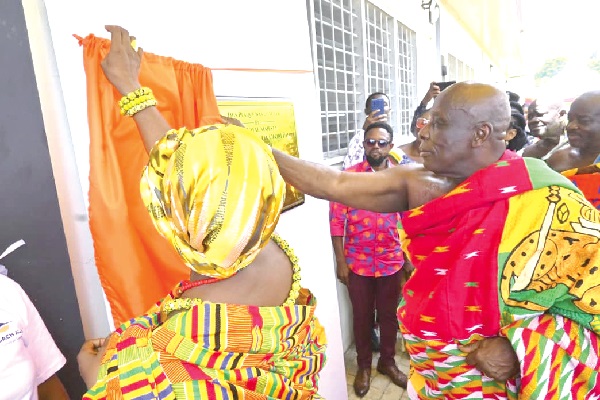A garment and textile factory aimed at empowering women and young girls to take up opportunities in the sewing and fashion industry as a profession has been inaugurated at Kyebi in the Eastern Region.
Lifestyle Textile and Garment Export Limited (Lifestyle), the first of its kind in Kyebi, currently employs 70 workers from the Akyem Abuakwa Traditional Area.
The factory has 100 sewing machines and produces assorted school uniforms, T-shirts, children, women and men’s wear, as well as curtains and armrests
The project was funded by the German Federal Ministry for Economic Cooperation and Development under its “Invest For Jobs Programme”, a special initiative being implemented by the German Development Agency (GIZ).
Empowering women
The Chief Executive Officer of Lifestyle, Susana Mitchell, described the opening of the factory as a testament to her outfit’s commitment to women empowerment with skills and promotion of inclusivity.
Starting with 30 machines when the factory opened in 2020, she said the factory now has close to 100 machines and there were plans to add 300 more to employ 450 people by the end of this year.
“We aim to build a state-of-the-art factory at Asikam, a few miles from Kyebi, which will have the capacity to hold some 2,000 sewing machines, which will create jobs for nearly 3,000 women in the Akyem Traditional Area,” she said.
She said the project had been made possible through a collaboration with the office of the Okyenhene, GIZ and the Eastern Regional Tailors and Dressmakers Association.
Ms Mitchell said the company aimed to recruit graduate students from the School of the Deaf to join its training and programme in the near future.
“Disability is not inability, and we believe in providing job opportunities for the marginalised in our society,” she said.
She expressed her appreciation to GIZ and the Okyenhene, Osagyefuo Amoatia Ofori Panin, for their “unwavering dedication and support” to the project, as well as his advocacy for education, job creation and AIDS prevention, treatment and care.
Opportunities
The Okyenhene said he was overwhelmed and fascinated by the idea of the CEO of Lifestyle company setting up the factory in Kyebi.
He said the problems Africans had always had with poverty were due to a lack of opportunities in rural communities.
“Our country has completely ignored rural Ghana and so people in rural areas are women and men who have been stripped of their dignity because they cannot find any work to earn decent wages to take care of their families
“So, this factory is not just for making garments but for enriching women and families.
“This edifice, noble idea and factory will change livelihoods because there is a place that you can go to and there is a place to dream of going to work,” the Okyenhene said.
Dedication
Applauding the CEO for setting up the factory to provide jobs for women in Kyebi, the Okyenhene said, “God bless you for what you have been able to do, as the story of Kyebi will not be the same.
“What we have seen is great for us and great for the country; it is good for our mothers and young girls,” he said and urged the workers to be dedicated and honest.
“Treat this factory as if your life depends on it; you can find human potential here, but if you decide to come to work and do not have the decency and honesty to work to build this together, then this factory will not survive,” he advised.
The Head of Component at GIZ, Simone Hochstein, said the setting up of the factory represented another milestone for creating employment opportunities within the textile and garment sector, which was one of the focused sectors of the “Invest For Jobs Programme”.
The programme, he said, sought to address a growing unemployment problem in Ghana with targeted measures that aimed, among others, at training young people for decent jobs in diverse sectors in Ghana.


